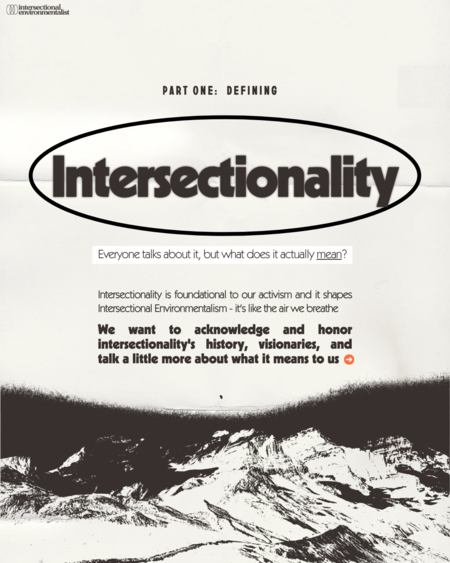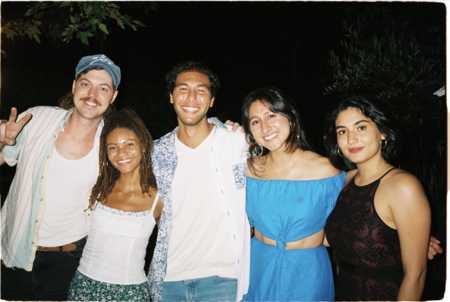Racial and socioeconomic justice is key to climate action in every realm.
Privilege, power, and oppression play an integral role in deciding who is most impacted by climate change: Black, Brown, Indigenous, People of Color and migrant communities. The Environmental Justice program is a dedicated space to amplify the voices and stories of those who bear the brunt of climate impacts, but have been left out of the decision making. It means learning from and letting the most vulnerable communities lead, and centering environmental justice in all climate conversations.
Here are some resources to help you learn more:
Read
Rachel Cargle and Leah Thomas Talk Black Climate Optimism
When it comes to the climate movement, joy and optimism often fall by the wayside. Intersectional Environmentalist founder, Leah Thomas, and social entrepreneur, Rachel Cargle, discuss how climate optimism is misunderstood and why this needs to change.
Why Every Environmentalist Should Be Anti-Racist
Leah Thomas, the founder of Intersectional Environmentalist, examines how the Black Lives Matter movement and environmentalism are linked: "These disparities are leading to both health and environmental crises that fall along racial lines in communities across the United States. The systems of oppression that have led to the deaths of so many Black people were the same systems that perpetuated environmental injustice. This realization pointed me to the term “intersectional environmentalism,” and compelled me to introduce it into environmentalist dialogue—to spark conversation and mobilize the environmental community to be anti-racist and not complicit."
Pollution Is Killing Black Americans. This Community Fought Back.
African-Americans are 75 percent more likely than others to live near facilities that produce hazardous waste. This piece offers a look at how Black communities shoulder a disproportionate burden of the nation’s pollution and how a neighborhood in the Grays Ferry neighborhood of Philadelphia fought back.
Alaska Natives Lead a Unified Resistance to the Pebble Mine
The effort to stop a massive mine project in Bristol Bay, Alaska, has been a decades-long fight for the region’s Indigenous People. Five tribal leaders share their experiences and discuss how salmon sustains the people, the economy, the ecosystem, and their culture.
Front-Line Communities are Vital for Biden's 40 Percent Climate Justice Pledge
Gloria Walton, President and CEO of The Solution's Project, writes about the front-line communities in our dirty-energy economy: "These communities aren’t just sitting on the sidelines. They are building power and enacting some of the most cost-effective and creative solutions to address the consequences of the climate crisis. They are implementing climate solutions in an effort to curb greenhouse gas emissions, while creating good jobs and addressing other community needs in the process. These are exactly the “disadvantaged communities” where the Justice40 Initiative’s benefits should flow."
Watch
Throughout the video’s progression, friends of Intersectional Environmentalist unpack the vital contributions that Black, Indigenous, and people of color have made to the environmental movement. Their goal is to support these often-overlooked narratives and the original stewards of our lands; encourage folks to reclaim their relationships with nature; and amplify initiatives that are creating a more just, equitable future for all people and the planet.
In order to bring intersectionality to modern environmentalism, we need to know what intersectionality means. Tune in to learn about Kimberlé Crenshaw, how the team and council at Intersectional Environmentalist define “intersectionality”, and how the IE community came to be.
Communities for a Better Environment does critical work on environmental justice and empowers Californian communities to stand up to polluting industries and build a green energy future. This short film highlights the hope and tenacity of the young activists of Wilmington, California as they push the Los Angeles City Council to prohibit new and existing oil and gas drilling operations within 2,500 feet of homes, schools and hospitals.
Act
Ask decision-makers in Congress and the EPA to support permanent protections for Bristol Bay
Thanks to strong science and grassroots opposition that started in Bristol Bay and permeated communities nationwide, the proposed Pebble mine faced challenges that ultimately led to the denial of its key federal permit in November 2020. Now, we focus on the future. We need your help to secure community-supported, long-term protections so that Pebble- or any other mining company- cannot threaten the people, fish, and fish-based resources of the region again. Please take action today using this form.
Interactive Map Reveals Which Indigenous Lands You’re Living On
Native Land’s mission is to map Indigenous lands in a way that changes, challenges, and improves the way people see the history of their countries and peoples. They hope to strengthen the spiritual bonds that people have with the land, its people, and its meaning. Native Land's strives to map Indigenous territories, treaties, and languages across the world in a way that goes beyond colonial ways of thinking in order to better represent how Indigenous people want to see themselves.
Nonprofits Fighting for Social & Environmental Justice
The climate crisis is much more complex and intertwined with many injustices and social inequities. From food insecurity and hazardous pollution to crippling natural disasters, the negative impacts of the environmental crisis affect people of color at much higher rates than other communities
1% for the Planet outlined a list of nonprofit organizations that you can donate your time and money to, that work at the pivotal intersection of race and the environment. These organizations work on a range of issues from food insecurity and urban agriculture, to representation in the outdoors and leadership in climate advocacy.
Biden: Follow through on your environmental justice commitments
Those most targeted by these unjust practices are also on the front lines of more powerful storms and floods, intense heat waves, deadly wildfires, devastating droughts, and other threats from the climate crisis. Now is the time for bold and concrete solutions to rebuild our country in a sustainable and equitable way.

